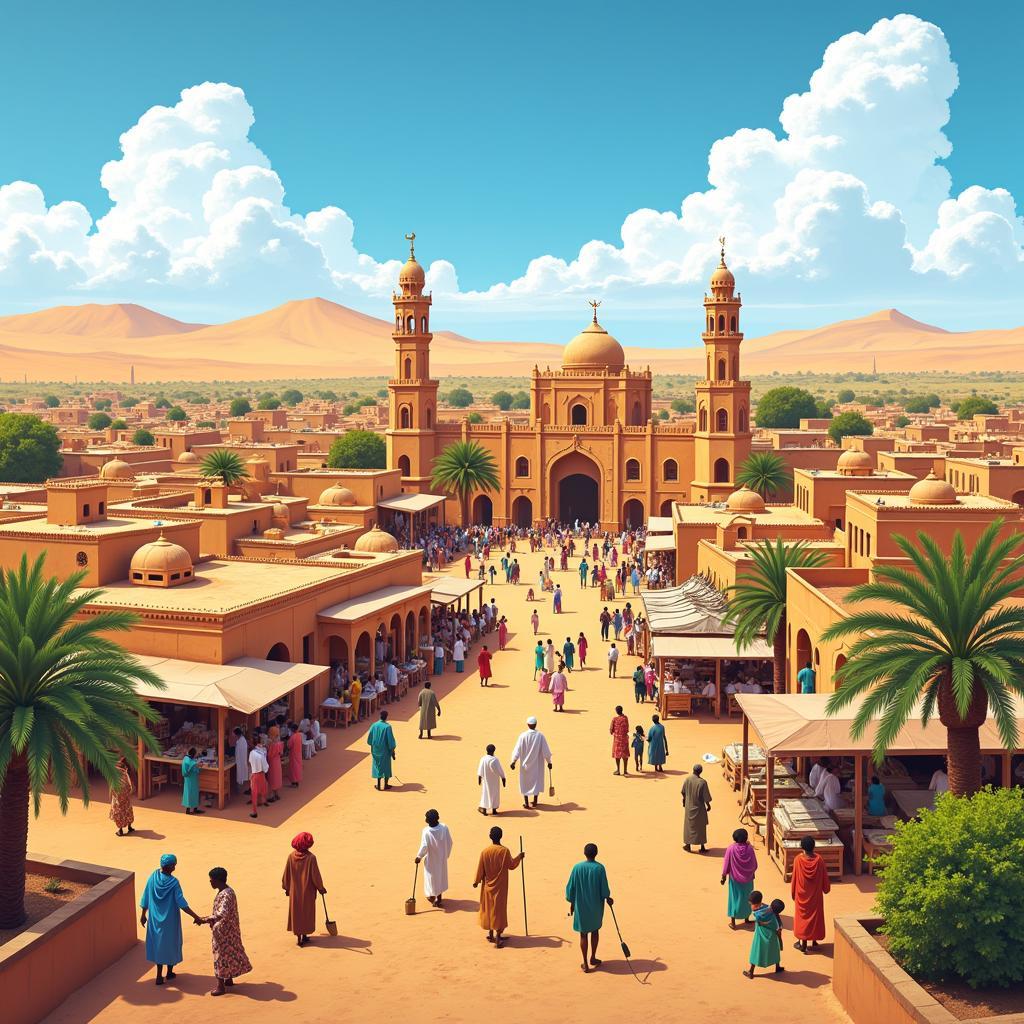Trade played a crucial role in the development of advanced societies in early Africa. From the bustling markets of ancient Egypt to the extensive trade networks of the trans-Saharan region, the exchange of goods and ideas spurred innovation, fostered cultural exchange, and laid the foundation for complex social structures. This article will explore how trade helped early Africans build thriving civilizations and shape the course of history.
The Impact of Trade on Early African Societies
Early African societies benefited immensely from both internal and external trade. Internal trade, within different regions of Africa, facilitated the distribution of essential resources like food, minerals, and raw materials. This interdependency strengthened local economies and encouraged specialization in various crafts and industries. External trade, with civilizations outside Africa, such as those in the Middle East, Asia, and Europe, opened up new markets for African goods and introduced new technologies and ideas to the continent.
The Trans-Saharan Trade Route: A Catalyst for Growth
The trans-Saharan trade route, a network of ancient caravan routes that crisscrossed the Sahara Desert, served as a vital artery for trade between North Africa and sub-Saharan Africa. This route facilitated the exchange of gold, salt, ivory, textiles, and slaves, among other commodities. The wealth generated from this trade fueled the rise of powerful empires like Ghana, Mali, and Songhai, which controlled vast territories and boasted sophisticated administrative systems. These empires developed complex social hierarchies, advanced legal codes, and thriving centers of learning.
Trade and the Spread of Ideas and Technology
Trade not only facilitated the exchange of goods but also the dissemination of ideas and technologies. Through trade networks, new agricultural techniques, metalworking skills, and architectural styles spread across the continent. The introduction of Islam to sub-Saharan Africa via trade routes had a profound impact on the region’s culture, education, and legal systems. Islamic scholars established centers of learning, like the renowned University of Timbuktu, which became hubs of intellectual exchange and attracted students from across the world. This exchange of knowledge contributed significantly to the advancement of early African societies.
Trade and the Development of Urban Centers
Trade played a key role in the development of urban centers in early Africa. Cities like Timbuktu, Koumbi Saleh, and Rhapta flourished as important trading hubs, attracting merchants, artisans, and scholars from far and wide. These cities became centers of commerce, cultural exchange, and innovation. They developed sophisticated infrastructure, including marketplaces, mosques, libraries, and elaborate irrigation systems.
 Thriving City of Timbuktu During its Golden Age
Thriving City of Timbuktu During its Golden Age
How Did Early African Trade Influence the World?
The impact of early African trade extended far beyond the continent’s borders. African gold, ivory, and other resources were highly prized in other parts of the world, contributing to the growth of global trade networks. African innovations in agriculture, metalworking, and navigation also influenced other civilizations.
A Legacy of Innovation and Cultural Exchange
Early African trade left a lasting legacy of innovation and cultural exchange. The sophisticated trade networks, thriving urban centers, and advanced social structures that emerged in early Africa stand as a testament to the ingenuity and resilience of African civilizations. These societies demonstrate how trade can serve as a powerful engine for economic growth, cultural development, and social progress.
Dr. Anika Kwame, a prominent historian specializing in African trade, states, “The trans-Saharan trade routes weren’t just pathways for goods, they were conduits for knowledge, shaping the intellectual landscape of both Africa and the world.”
Challenges and Opportunities in Early African Trade
While trade brought immense benefits to early African societies, it also presented challenges. The slave trade, a dark chapter in African history, had devastating consequences for millions of Africans. However, despite these challenges, trade continued to play a vital role in shaping the continent’s destiny.
 Gold Mining in Ancient Africa: Fueling Trade and Development
Gold Mining in Ancient Africa: Fueling Trade and Development
Professor Kwame further observes, “Understanding the nuances of early African trade is essential to appreciating the complexity and dynamism of African history.”
Conclusion
How Did Trade Help Early Africans Develop Advanced Societies? The answer lies in the complex interplay of economic, social, and cultural factors that shaped the continent’s history. Trade fostered economic growth, facilitated the exchange of ideas and technologies, and contributed to the development of sophisticated urban centers. The legacy of early African trade continues to resonate today, reminding us of the power of trade to shape the course of human civilization. Trade was, and continues to be, a vital force in the development of African societies.
FAQ
- What was the most important item traded in early Africa? Gold, salt, and ivory were among the most important items traded.
- How did the trans-Saharan trade route impact West Africa? It facilitated the rise of powerful empires like Ghana, Mali, and Songhai.
- What role did trade play in the spread of Islam in Africa? Trade routes served as pathways for the spread of Islamic ideas and culture.
- What were some of the major trading centers in early Africa? Timbuktu, Koumbi Saleh, and Rhapta were major trading hubs.
- How did trade contribute to the development of advanced societies in Africa? It fostered economic growth, cultural exchange, and the development of complex social structures.
- What were the negative consequences of trade in early Africa? The slave trade had devastating impacts on African populations.
- How did African trade influence the world beyond Africa? African resources and innovations contributed to the growth of global trade networks and influenced other civilizations.
Need support? Contact us 24/7: Phone: 02043854663, Email: [email protected], or visit us at Zone 34, Bac Giang, 260000, Vietnam. We’re here to help.